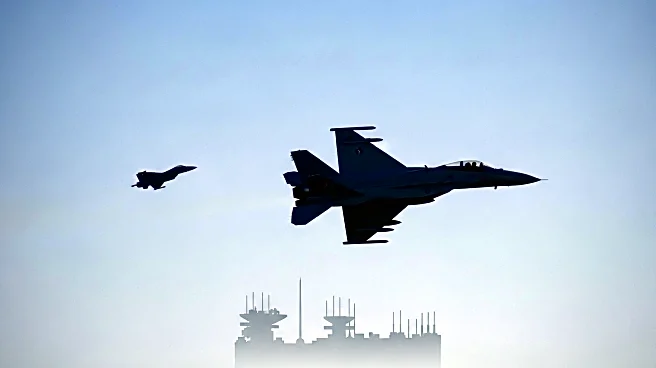What's Happening?
NATO forces responded swiftly to a recent violation of Estonian airspace by Russian MiG-31 aircraft. The incident occurred when three Russian jets, with transponders turned off, approached the Estonian border, prompting Italian airmen to intercept them using F-35s. The Russian aircraft were escorted out of Estonian airspace towards Kaliningrad. This incursion raised alarms beyond the Baltics, with Estonia's foreign minister condemning the action at the United Nations. In response, NATO has extended the deployment of Italy's SAMP/T anti-aircraft battery in Estonia and continues to enhance its surveillance capabilities in the region. The incident is part of a broader pattern of Russian provocations, including cyberattacks and information campaigns across Europe.
Why It's Important?
The violation of Estonian airspace by Russian jets underscores ongoing tensions between NATO and Russia. It highlights the strategic importance of the Baltic region and NATO's commitment to defending its member states. The incident has prompted discussions among NATO commanders about further security enhancements under the Eastern Sentry mission. Estonia's defense minister has emphasized the need for increased defense spending and continued support for Ukraine. The situation reflects broader geopolitical dynamics, with Russia's actions seen as attempts to test NATO's resolve and unity. The extension of military deployments in Estonia signals NATO's readiness to counter potential threats and maintain regional stability.
What's Next?
NATO commanders are scheduled to meet in Riga, Latvia, to discuss additional security measures for the Baltic region. The focus will be on enhancing surveillance and defense capabilities to deter further Russian incursions. Estonia plans to increase its defense budget and continue supporting Ukraine financially. The ongoing situation may lead to heightened military readiness and strategic adjustments by NATO allies. Observers will be watching for any further provocations by Russia and the alliance's response, which could influence future diplomatic and military engagements in the region.
Beyond the Headlines
The incident raises questions about Russia's motives and the potential for escalation in the region. It highlights the complex interplay between military actions and cyber warfare, as Russia employs a multifaceted approach to challenge NATO. The situation also underscores the importance of international cooperation and intelligence sharing among NATO members to effectively counter threats. The broader implications for European security and the balance of power in the region remain significant, as NATO seeks to maintain deterrence while avoiding direct conflict.











